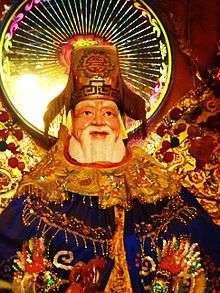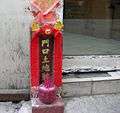Tudigong
Tudigong (土地公 "Lord of the Soil and the Ground") or Tudishen (土地神 "God of the Soil and the Ground"), also known simply as Tudi (土地 "Soil-Ground") is a tutelary deity of a locality and the human communities who inhabit it in Chinese folk religion.[1]
| Tudigong | |||||||||||||||||
|---|---|---|---|---|---|---|---|---|---|---|---|---|---|---|---|---|---|
 | |||||||||||||||||
| Chinese | 土地公 | ||||||||||||||||
| Literal meaning | Lord of the Soil and the Ground | ||||||||||||||||
| |||||||||||||||||
| Alternative Chinese name | |||||||||||||||||
| Chinese | 土地 | ||||||||||||||||
| |||||||||||||||||
| Second alternative Chinese name | |||||||||||||||||
| Chinese | 土公 | ||||||||||||||||
| |||||||||||||||||
.jpg)
Names
Other names of the god include:[2]
- Tugong (土公 "Lord of the Soil");
- Tudiye (土地爺 "Soil-Ground Father");
- Dabogong (大伯公 "Great Elder Lord") or Bogong (伯公 "Elder Lord");
- Sheshen (社神 "God of the Soil") or Shegong (社公 "Lord of the Soil");
- Tudijun (土帝君 "Ruler God of the Soil").
Extended titles of the god include:
- Tudihuofushen (土地或福神 "God who May Bless the Soil");
- Fudezhengshen (福德正神 "Right God of Blessing and Virtue") or Fudegong (福德公 "Lord of Blessing and Virtue").
Commoners often call Tudigong "grandfather" (yeye), which reflects his close relationship with the common people.[1]
Variants
Tudipo
In the countryside, he is sometimes given a wife, Tǔdìpó (土地婆 "Grandmother of the Soil and the Ground"), placed next to him on the altar. She may be seen as a just and benevolent deity on the same rank as her husband, or as a grudging old woman holding back her husband's benedictions, which explains why one does not always receive fair retribution for good behavior.[1]
Another story says that Tudipo is supposed to be a young lady. After Tudigong received a heavenly rank, he gave everything that the people asked for. When one of the gods went down to Earth to do inspections, he saw that Tudigong was distributing blessings unnecessarily. Soon after that, the god went to the Celestial Palace and reported to the Jade Emperor.[1]
After the Jade Emperor knew this, he found out that there was a lady that was going to be killed, but she was not guilty. Thus, the Jade Emperor told a god to go down to Earth and bring the lady to heaven. When the lady was brought to the Celestial Palace, the Jade Emperor bestowed her to Tudigong as his wife. She was ordered to look after how many blessings Tudigong distributes and that they not be unnecessarily distributed. This is why many people do not want to pay respect to Tudipo, because they are afraid that she will not let Tudigong give much wealth to them.[1]
Dizhushen
The Landlord God (Chinese: 地主神; pinyin: Dìzhǔ shén) is a deity worshipped in Chinese folk beliefs who is analogous but is not to be confused with Tudigong. The tablet for the Landlord God is typically inscribed with (middle two rows) "left: The Earth God of Overseas Tang People (overseas Chinese; 唐番地主財神), right: The Dragon of Five Sides and Five Lands (五方五土龍神; fengshui). The side inscriptions mean "The wealth comes from ten thousand directions and the business comes from thousands of miles." It is believed that the Landlord God has powers to help gather wealth, and the position of the tablet must be placed properly according to the laws of fengshui.[1]
Village Gods
The Village God has developed from land worship. Before Chenghuangshen ("City God") became more prominent in China, land worship had a hierarchy of deities conforming strictly to social structure, in which the emperor, kings, dukes, officials and common people were allowed to worship only the land gods within their command; the highest land deity was the Houtu ("Queen of the Earth").
Ranked beneath City Gods, the Village Gods have been very popular among villagers as the grassroot deities since the 14th century during the Ming dynasty. Some scholars speculate that this change came because of an imperial edict, because it is reported that the Hongwu Emperor of the Ming dynasty was born in a Village God shrine. The image of the Village God is that of a simply clothed, smiling, white-bearded man. His wife, the Grandmother of the Village, looks like a normal old lady.[1]
Festivals
In Taiwan, festivals dedicated to Tudigong typically take place on the second day of the second month and the 15th day of the eighth month on the Chinese lunar calendar.[3]
Gallery
 A temple dedicated to Fude in Wujie, Yilan, Taiwan.
A temple dedicated to Fude in Wujie, Yilan, Taiwan. A small altar for Tudi part of a Chinese tomb, Indonesia.
A small altar for Tudi part of a Chinese tomb, Indonesia. A doorway spirit tablet dedicated to Tudigong in Hong Kong. It invokes Tudigong to bring blessings.
A doorway spirit tablet dedicated to Tudigong in Hong Kong. It invokes Tudigong to bring blessings.
See also
- Agriculture in Chinese mythology
- Chinese folk religion
- Chinese mythology
- Fengshui
- Nisse (folklore)
- Religion in China
- Soil and grain
- Spirit tablet
References
- The Encyclopedia of Malaysia, vol. Religions & Beliefs, edited by Prof. Dr M. Kamal Hassan & Dr. Ghazali bin Basri. ISBN 981-3018-51-8
- Keith G. Stevens, Chinese Mythological Gods, Oxford University Press, USA, (November 8, 2001), pages 60, 68, 70, ISBN 0-19-591990-4 or ISBN 978-0-19-591990-5
- Cheng, Shuiping (2011). "Earth God". Encyclopedia of Taiwan. Council for Cultural Affairs. Archived from the original on 20 July 2012. Retrieved 24 February 2012.